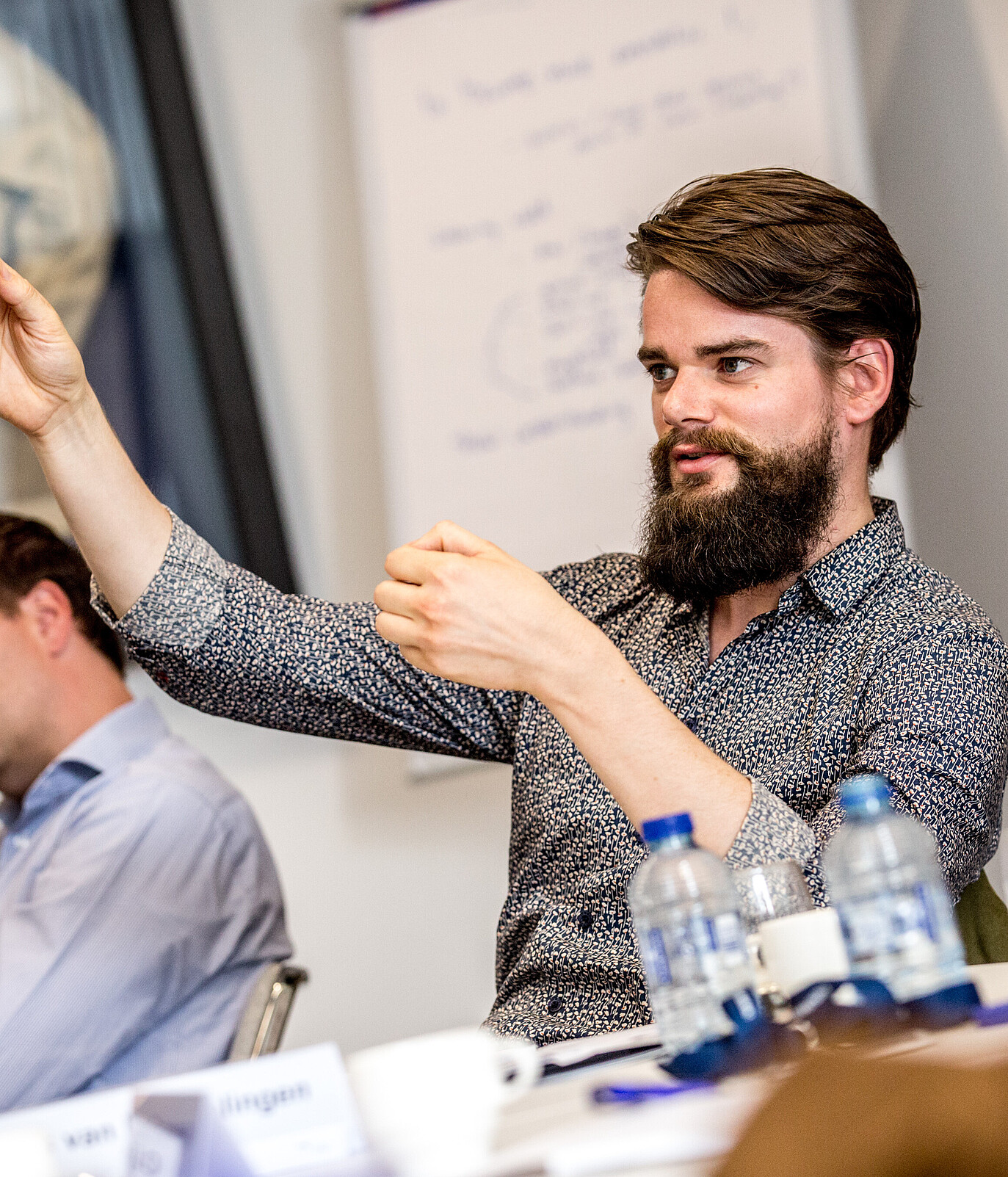

The transition to a low-carbon future is one of the most critical challenges of our time.
Yet, despite scientific consensus on critical aspects of climate science and rapid technological advancements, myths about the energy transition continue to slow progress and sow confusion. In this blog, Dr Steve Kennedy from Rotterdam School of Management, Erasmus University (RSM) tackles some of the most pervasive myths about climate action and renewable energy. These myths not only undermine urgency but also distract us from pragmatic solutions.
1.5 degrees of warming doesn't matter.
It's too expensive to mitigate climate change.
Renewable energy takes too much fossil fuel to produce.
Carbon capture and storage (CCS) is a better bet.
Renewables are worse for the environment and communities.
We can just plant trees to offset emissions.

Some argue that aiming to limit global warming to 1.5 degrees Celsius is unnecessary, and settling for a higher threshold, such as 2 degrees, is more realistic and affordable. However, this reasoning ignores the science of tipping points. At 1.5 degrees of warming, Earth systems begin to work against us, activating feedback loops that accelerate climate change.
For example, as Arctic ice melts, the ice-albedo effect diminishes: less sunlight is reflected, and more heat is absorbed by the planet, further amplifying warming. Studies, including those published in Science and reports from the World Meteorological Organization, confirm that overshooting 1.5 degrees could trigger cascading climate tipping points – such as thawing permafrost and dying rainforests – that make it exponentially harder to halt runaway climate change.
Conclusion:
The 1.5-degree target is not just a benchmark; it’s a critical threshold to avoid activating catastrophic and self-reinforcing climate impacts. Every fraction of a degree matters.
Another common argument is that addressing climate change is prohibitively costly and that we should instead focus on adapting to its impacts. This narrative fails to account for the monumental costs of inaction. From rising insurance premiums due to extreme weather events to the devastating economic losses from floods, droughts, and wildfires, the cost of adaptation alone is far higher than the price of mitigation.
The seminal Stern Review and more recent studies in journals like Nature have repeatedly shown that reducing greenhouse gas emissions is far cheaper in the long run than dealing with the aftermath of unchecked warming. The economic commitment required to tackle climate change is significant, but it pales in comparison to the potential damage to economies, infrastructure, and human well-being if we do little or nothing.
Conclusion:
The costs of inaction outweigh the costs of proactive measures. Investing in mitigation today is the fiscally responsible path forward.
A claim sometimes made is that renewable energy technologies, such as solar panels and wind turbines, require so much energy to produce that they negate their environmental benefits. This myth ignores the empirical evidence on carbon and energy payback time – the time it takes for a renewable energy system to generate the amount of carbon emitted and energy used in its production.
For example, there are many studies on energy payback times and carbon footprint of commercial photovoltaic systems and wind power.
Given that these systems can last 25 years or more, their net energy production can vastly exceed their initial embodied energy. Yet care is needed in their suitable placement to support good performance and manufacturing processes that strive to minimise embedded energy. This study shows that the environmental payback can be very long if these conditions are not well considered. Moreover, their lifetime greenhouse gas emissions are a fraction of those from fossil fuels.
Conclusion:
The embodied energy of renewables is minimal compared to their lifetime benefits. They are a vital solution for decarbonising energy systems.
Some suggest that instead of transitioning to renewables, we should rely on large-scale deployment of carbon capture and storage (CCS) to manage emissions. While CCS has a role to play in hard-to-abate sectors, it’s neither a silver bullet nor a cost-effective alternative to renewables.
Despite decades of research and pilot projects, CCS remains expensive and very difficult to scale. A study published in Joule highlights that the costs of CCS have not declined over its 50-year history, unlike renewables, which have seen exponential cost reductions. Also, many CCS pilot projects have failed to deliver, casting doubt on its reliability as a cornerstone of decarbonisation.
Conclusion:
CCS may help in specific cases and will play a role in the energy transition, but banking on it as a primary strategy is a costly and highly risky gamble.
Download the brochure for our innovative executive programme Leading the Energy Transition
Critics of renewables often point to their environmental and social downsides, such as mining for materials and poorly planned projects that harm ecosystems or marginalise local communities. While these issues are real, they are not inherent to renewable energy but rather to how projects are executed.
The solution lies in better design, governance and planning. Renewable projects should adopt circular economy principles, ensuring materials can be repurposed and recyclable, and systems are designed for long life, repair and reuse. Projects must also involve local communities in decision-making processes and ownership, ensuring equitable benefits and preventing exploitation.
Conclusion:
The challenges of renewables are surmountable with responsible design, planning and inclusive governance. They remain far less damaging than fossil fuels.

Reforestation and afforestation are often presented as a magic solution to climate change. But, current carbon removal plans involve unrealistic land-use demands. For example, achieving net-zero targets through tree planting alone could require land equivalent to five times the size of India, as highlighted by organisations like Oxfam.
While trees are a vital part of carbon sequestration, they must complement, not replace, direct emissions reductions. Achieving net-zero emissions requires a balance: reducing emissions at the source and using carbon removal to address residual emissions that are difficult to eliminate.
Conclusion:
Tree planting is essential but insufficient. Real climate action prioritises emission reductions alongside supplementary carbon removals.
… the energy transition is fraught with challenges, but it’s also brimming with opportunities. Dispelling myths and embracing evidence-based strategies will help us forge a sustainable future. As individuals, businesses, and policymakers, we must act decisively, informed by science, to ensure a just and rapid transition to a low-carbon world.

Addressing these myths is critical to fostering informed decision-making and accelerating the energy transition. At RSM, we empower leaders with the knowledge and tools to navigate the complexities of this transition through our short course, Leading the Energy Transition.
Designed for professionals eager to drive meaningful change, the five-day course take a holistic view on the energy transition from five perspectives: leadership and transformation, geopolitics, technology and operations, finance and innovation, and social engagement and stakeholder management.
RSM also offers an award-winning free online course (MOOC) for professionals to explore the role of business in contributing to a better future for people and the planet without giving up profits, by using the United Nation’s Sustainable Development Goals (SDGs) as a framework for addressing these massive global problems.

Dr Steve Kennedy is an associate professor at RSM, specialising in business sustainability. His research explores how systems and resilience thinking can drive organisational innovation to address global challenges like climate change and biodiversity loss. He also conducts qualitative and conceptual studies on sustainability accounting, circular economy business models, and responsible management education, with his work appearing in esteemed journals like Journal of Management Studies, Journal of Management and Business Strategy & the Environment.
Dr Kennedy serves as scientific director of the Centre for Eco-Transformation and is active in professional groups like the Academy of Management’s Organizations & Natural Environment division and GRONEN. A former academic director of RSM’s MSc Global Business & Sustainability (2015–2021), he also contributes to the Principles for Responsible Management Education (PRME). He teaches diverse courses, including Climate Change Strategy Role-Play and Business Sustainability & Social-Ecological Systems, across educational levels.